

Universal Declaration of Human Rights. Preamble Whereas recognition of the inherent dignity and of the equal and inalienable rights of all members of the human family is the foundation of freedom, justice and peace in the world, Whereas disregard and contempt for human rights have resulted in barbarous acts which have outraged the conscience of mankind, and the advent of a world in which human beings shall enjoy freedom of speech and belief and freedom from fear and want has been proclaimed as the highest aspiration of the common people, Whereas it is essential, if man is not to be compelled to have recourse, as a last resort, to rebellion against tyranny and oppression, that human rights should be protected by the rule of law, Whereas it is essential to promote the development of friendly relations between nations, Whereas Member States have pledged themselves to achieve, in co-operation with the United Nations, the promotion of universal respect for and observance of human rights and fundamental freedoms, Article 1.
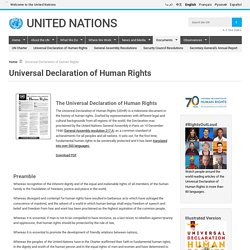
Article 2. Why Privacy Matters Even if You Have 'Nothing to Hide' - The Chronicle Review. By Daniel J.
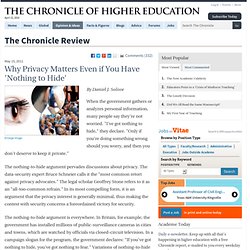
Solove When the government gathers or analyzes personal information, many people say they're not worried. "I've got nothing to hide," they declare. "Only if you're doing something wrong should you worry, and then you don't deserve to keep it private. " The nothing-to-hide argument pervades discussions about privacy. The nothing-to-hide argument is everywhere. What am I missing in the Snowden affair? - Opinion. I would have thought that there was a clear set of principles that make the American diplomatic pursuit of Edward Snowden as a fugitive from justice a rather empty and futile gesture.
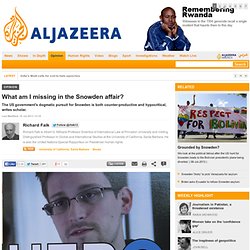
As far as I can tell, there is not even a need for asylum as governments should have been prepared to grant Snowden residence status because his alleged criminal acts in the United States were without question political crimes , without violence or monetary motivation. I had thought it was as clear as law can be that any person who has committed a political crime should be exempted from mandatory extradition even if a treaty existed imposed a duty on its parties to hand over individuals accused of serious criminal activity.
To be sure, from the perspective of the United States government, Snowden's exposure of the PRISM surveillance program was a flagrant violation of the Espionage Act. But it was also as clearly a political crime as almost any undertaking can be. Inherent hypocrisy. End the Snowden circus now - Opinion. I find the discourse surrounding the Snowden Affair bewildering.
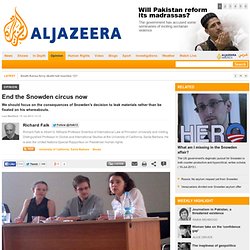
The latest reports suggest that the United States is using maximum political leverage, including coercive diplomacy, to discourage small Latin American countries from granting asylum to Edward Snowden. It is also complaining that Russia is giving Snowden ‘a propaganda platform’ and expressing its ‘disappointment’ with China/Hong Kong for its earlier refusal to expel Snowden back to the United States to face charges once his passport was cancelled. This anger is surely misdirected. Taking the overall situation into account, whatever anger is generated, should rather be directed at the United States for employing such arrogant language and crude methods in its hopefully vain effort to gain custody over Snowden. From almost every angle of relevant law, morality, and politics the case for protecting Snowden against the long arm of American criminal law is overwhelming.
Media misdirection Bait and switch. America’s Shameful Human Rights Record. The 18th Session of the Human Rights Council. The food crisis, the threat of a second global recession, the protest movements in the Middle East, North Africa and elsewhere, the Human Rights Council’s investigations of allegations of gross human rights violations in Libya, Syria and Côte d’Ivoire and a renewed call for States to respect human rights in counter terrorism strategies are highlighted in High Commissioner Pillay’s opening address to the 18th session of the Human Rights Council. WissensWerte: Menschenrechte Global financial crisis as a human rights issue. Geneva, Switzerland - It's been more than 20 years since I first came to the UN Headquarters here to report on a human rights issue.
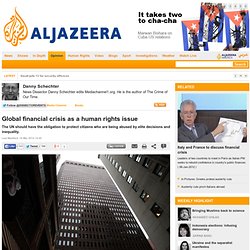
Then, it was about the cultural boycott of apartheid South Africa. A few years later, South Africans would win their freedom. Now, I am back in the maze of conference rooms, hoping to be covered. My topic these days is the financial crisis as a human rights issue and I was invited by an international NGO to bring it to the sessions alongside the Human Rights Council composed of 47 member states. As a journalist, I am uncomfortable being an advocate in such a ritualistic politicised process that every year witnesses scores of oppressed peoples seeking relief or visibility for causes that seldom get any attention outside of the UN basement. That's where these issues often end up being heard before being filed away in archives that few media outlets ever consult. Marco Civil da Internet: Brasilien erarbeitet Grundrechtekatalog für das Internet. Brasilien gibt sich gerade einen Grundrechtekatalog für das Internet.
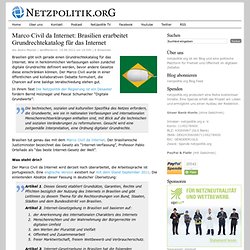
Wie in herkömmlichen Verfassungen sollen zunächst digitale Grundrechte definiert werden, bevor andere Gesetze diese einschränken können. Der Marco Civil wurde in einer öffentlichen und kollaborativen Debatte formuliert, die Chancen auf eine baldige Verabschiedung stehen gut. In ihrem Text Die Netzpolitik der Regierung ist ein Desaster fordern Bernd Holznagel und Pascal Schumacher “Digitale Grundwerte”: Die technischen, sozialen und kulturellen Spezifika des Netzes erfordern, die Grundwerte, wie sie in nationalen Verfassungen und internationalen Menschenrechtserklärungen enthalten sind, mit Blick auf die technischen und sozialen Veränderungen zu reformulieren.
Gesucht wird eine zeitgemäße Interpretation, eine Ordnung digitaler Grundrechte. Brasilien tut genau das mit dem Marco Civil da Internet. Internationaler Pakt über bürgerliche und politische Rechte › UN-Zivilpakt. Vom 16.
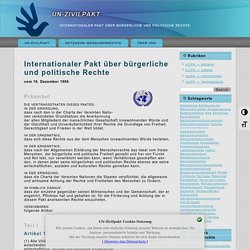
Dezember 1966 Präambel DIE VERTRAGSSTAATEN DIESES PAKTES,IN DER ERWÄGUNG, dass nach den in der Charta der Vereinten Nationen verkündeten Grundsätzen die Anerkennung der allen Mitgliedern der menschlichen Gesellschaft innewohnenden Würde und der Gleichheit und Unveräußerlichkeit ihrer Rechte die Grundlage von Freiheit, Gerechtigkeit und Frieden in der Welt bildet,